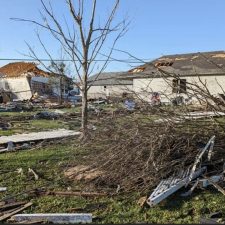
On August 29, 2021, sixteen years from the day Hurricane Katrina hit the Gulf Coast, Hurricane Ida made landfall in south Louisiana near Port Fourchon. It was tied for the strongest storm to ever hit the State of Louisiana. The devastation from Ida can be seen from Terrebonne Parish to Orleans and then all way north to Tangipahoa. Over a million people lost power and the restoration efforts will take many months and in s
Although a fortunate few in Orleans Parish are back online and crews across southern Louisiana are making progress clearing trees from roadways, the monumental task of cleaning up, rebuilding, and getting back to something like normal has only just begun.
As of this posting, more than a million homes and businesses were without power and health officials report that 600,000 Louisiana residents lack running water. At least six fatalities have been attributed to Hurricane Ida, and some low-lying communities remain mostly underwater. One private firm estimates Ida could end up doing $50 billion dollars worth of damage.
The numbers mean nothing to the homeowners and business owners who have had their lives devastated by this historic storm. And while it’s natural to feel powerless in the face of natural catastrophe, those with homeowners and business insurance can — and should — busy themselves with the doable, if somewhat daunting, task of submitting their claim. In addition to imparting a much-needed sense of control, filing your claim swiftly, with the help of the tips below, is the surest way to get what you’re entitled to receive from the insurance that you have paid thousands of dollars to maintain and to get your world back together.
1. File your Ida claim immediately.
If your home or place of business has sustained damage from Hurricane Ida and you have a homeowners or business insurance policy, file your claim with the insurer as soon as possible. Insurance companies are overwhelmed with claims following a major disaster like Ida, and you should not wait to completely assess the damage before filing.
To be clear, however, you should confirm that you have covered property damage. Once that is done, the more quickly you make your claim, the more quickly the process will begin and, hopefully, the more quickly you can begin to rebuild.
2. Document any and all correspondence and communication with your insurer.
It’s critical to the process (and your peace-of-mind) that everyone involved stays on the same page, so keep a record of all communications with your insurance company and the adjuster assigned to your claim. Confirm, whenever possible, any verbal conversations with e-mails, texts, or letters so that everyone is clear as to your specific requests and your insurer’s commitments.
This is also important to confirm the date by which you provided your insurance company with satisfactory proof of loss. Once that is done, the deadlines set forth in La. R.S. 22:1892 and La. R.S. 22:1973 will begin to run, which can lead to insurers being penalized for delaying in the payment of claims. Click here to learn more about the Louisiana insurance bad faith laws and the applicable penalties.
3. Document your loss with video and photographs.
In the event of any dispute about whether particular damage was hurricane-related, video and photographs will go a long way towards a successful resolution. Ideally, such documentation would be made in real-time right after the storm.
That, of course, may not be an option for those who evacuated before the storm. In lieu of real-time documentation, video and photograph the damage to your home or business as soon as possible; the closer the correspondence between the video/photo timeline and your public safety authority’s go-ahead to access your property the better.
4. Perform your own due diligence and do not depend solely on the insurance adjuster.
No one knows — or cares about– your home and/or business better than you. Assigned by the insurance company to assist you with your claim, even the most professional adjusters simply do not share your perspective and situational familiarity; do not depend on them to document and determine the amount you are entitled to under the terms of the policy you paid for.
Put a value on your loss by securing repair estimates from Louisiana-licensed contractors. The same goes for personal property, the value of which can be researched online. Submit supporting documents for both to your insurance company yourself.
5. Review and thoroughly understand your insurance policy.
Because they are legal contracts between companies (insurers) and persons, businesses or other entities, insurance policies should be thoroughly reviewed by those holding them so that they fully understand all parties’ responsibilities in case of a loss and subsequent claim.
A policy, in other words, is a detailed promise by the company to cover specific losses in exchange for the premiums you’ve paid. Going into the claims process with a clear understanding of your policy makes the process more straightforward and efficient.
Policies may cover certain items and not cover others. There are also exclusions in policies that can give insurance companies a basis to deny coverage. Having a thorough understanding of your policy is the best way to know how to present your claim in the best light. A Louisiana insurance lawyer will be able to explain your policy and the pitfalls contained within it.
6. Be aware of any hurricane deductible.
Most homeowner and business insurance policies come with significant hurricane deductibles. Substantially higher than ordinary deductibles, hurricane deductibles often require holders to absorb tens of thousands of dollars in hurricane-related losses before the insurer is obligated to pay anything at all.
An important example of the advice on policy review above, awareness of the hurricane deductible prevents any potential disappointment with the amount that your insurance company is willing to pay you.
7. Keep track of associated living and recovery costs.
Living expenses (transportation, lodging, meals, etc.), as well as clean-up costs associated with Hurricane Ida, may be covered, at least in part, by your homeowner’s policy. These items often come within “Loss of Use” coverage. This coverage generally applies when your property suffers a covered loss (ex. you lose your roof) that makes it uninhabitable.
The insurance company would then cover the costs that you incurred for the time that you were unable to live at your house. Any such ancillary costs incurred as a result of evacuation and clean-up should be documented with receipts and submitted to your insurer.
One thing to keep in mind is that typically losing electricity alone will not suffice for loss of use coverage. This again highlights the need to have a thorough understanding of the provisions of your particular insurance policy to know your insurance company’s obligations to you.
Contact a Louisiana Insurance Lawyer Today
Filing an insurance claim of any kind is, by definition, recognition of loss. In the case of a massive disaster such as Hurricane Ida, that loss includes and transcends the merely money. A home is more than just architecture. A business is more than just a building.
As you begin the process of filing your claim and getting your life back, be assured that The Mahone Firm is here to help.
Some claims are relatively straightforward and go smoothly. Others, such as those on the scale we have in the wake of this tragic storm, may be greatly facilitated with the help of an experienced insurance attorney. Contact Louisiana insurance claims lawyer Mike Mahone today at (504) 564-7342 for a free consultation and personal, hands-on legal guidance.






